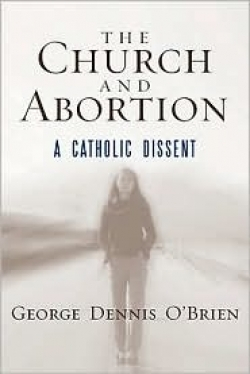The Church and Abortion
A Catholic Dissent
Dr. George Dennis O’Brien agrees with the American Catholic bishops that abortion is an intrinsic evil but, after that, there is little agreement on this issue: “While it sounds harsh, abortion is an intrinsic evil, though one that may be licit or even required, given other serious moral foundations,” he argues in The Church and Abortion.
An accomplished scholar and administrator—he taught philosophy at Princeton and Middlebury College and was president of the University of Rochester and Bucknell University—O’Brien has applied the wisdom gained through his experience in writing this important book. While debate about abortion often features uncompromising positions and assaultive language, O’Brien has managed to write in a reasoned, almost gentle, tone that expresses sensitivity to both the gravity of the event itself and to the tragic moral choice being made by the woman faced with the decision.
He does not, however, avoid confrontation. He challenges the Catholic bishops directly, noting that various Catholic spokesmen have called abortion “homicide,” “murder,” and “genocide.” But, he argues, “When launched into the political arena these claims mislead the faithful and do a disservice to the nation and the Church. Whatever the moral issues surrounding abortion—and they are serious—as political guidance these episcopal proclamations are sinful.”
This conclusion is supported by a basic gap in the bishops’ ethical argument. O’Brien notes a “fundamental principle in all ethical argument: who wills the end must will the means.” Failing to supply the means to reach the end espoused constitutes a half-truth. The Catholic bishops either do not know the means to reach their stated goal of eradicating abortion or are not prepared to examine the required means.
Examples in which pro-life advocates fail to support the logical means to attain their stated goals include attempts in South Dakota in 2006 and 2008 to pass restrictive laws criminalizing abortion, but which specifically excluded any criminal penalties for the woman obtaining an abortion. “If the bishops are to be helpful moral guides, they should give some indication of what would constitute prudence in public policy.”
Well-reasoned and thought-provoking, this book provides constructive guidance to anyone seeking insight into this issue, and a useful paradigm by which to analyze other public policy issues. It should be read by anyone interested in policy and the churches’ role in public debate—and anyone eligible to vote.
Reviewed by
John Michael Senger
Disclosure: This article is not an endorsement, but a review. The publisher of this book provided free copies of the book to have their book reviewed by a professional reviewer. No fee was paid by the publisher for this review. Foreword Reviews only recommends books that we love. Foreword Magazine, Inc. is disclosing this in accordance with the Federal Trade Commission’s 16 CFR, Part 255.

